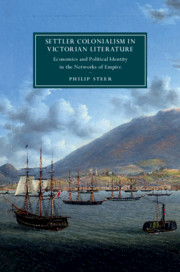 Settler Colonialism in Victorian Literature
Settler Colonialism in Victorian Literature Book contents
- Settler Colonialism in Victorian Literature
- Cambridge Studies in Nineteenth-Century Literature and Culture
- Settler Colonialism in Victorian Literature
- Copyright page
- Dedication
- Contents
- Figures
- Acknowledgments
- Introduction
- Chapter 1 The Transportable Pip
- Chapter 2 Gold and Greater Britain
- Chapter 3 Speculative Utopianism
- Chapter 4 Manning the Imperial Outpost
- Conclusion
- Bibliography
- Index
- Cambridge Studies in Nineteenth-Century Literature and Culture
Chapter 2 - Gold and Greater Britain
The Australian Gold Rushes, Unsettled Desire, and the Global British Subject
Published online by Cambridge University Press: 19 December 2019
- Settler Colonialism in Victorian Literature
- Cambridge Studies in Nineteenth-Century Literature and Culture
- Settler Colonialism in Victorian Literature
- Copyright page
- Dedication
- Contents
- Figures
- Acknowledgments
- Introduction
- Chapter 1 The Transportable Pip
- Chapter 2 Gold and Greater Britain
- Chapter 3 Speculative Utopianism
- Chapter 4 Manning the Imperial Outpost
- Conclusion
- Bibliography
- Index
- Cambridge Studies in Nineteenth-Century Literature and Culture
Summary
This chapter argues that the 1850s Australian gold rushes profoundly challenged the stadialist developmental logic underpinning political economy and novelistic realism. An initial response, Catherine Helen Spence’s Clara Morison: A Tale of South Australia During the Gold Fever (1854), cast gold digging in the language of romance, associated with financial speculation and social upheaval, and imagined the restoration of the stadialist norms of cultivation and culture. The emergence in Australia of the need for a new theory of subjectivity and society can be seen in W. E. Hearn’s Plutology: or, The Theory of the Efforts to Satisfy Human Wants (1864), which abandoned stadialism and labor in favor of a model of consumption based upon individual desire. The formal impact of such insights is also evident in works by metropolitan writers who had previously encountered the gold rushes. W. S. Jevons’ path-breaking “marginalist” Theory of Political Economy (1871) and Anthony Trollope’s sensation novel John Caldigate (1878-79) both center upon and normativize a British subject defined by desire, and through this contribute to a newly deterritorialized understanding of British subjectivity.
Keywords
- Type
- Chapter
- Information
- Settler Colonialism in Victorian LiteratureEconomics and Political Identity in the Networks of Empire, pp. 79 - 124Publisher: Cambridge University PressPrint publication year: 2020
